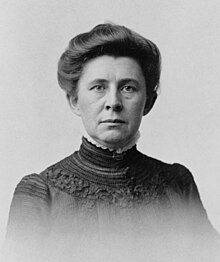Ida Tarbell | |
|---|---|
 Portrait in 1904 | |
| Born | Ida Minerva Tarbell November 5, 1857 Hatch Hollow, Amity Township, Erie County, Pennsylvania, U.S. |
| Died | January 6, 1944 (aged 86) Bridgeport, Connecticut, U.S. |
| Occupation |
|
| Notable works | The History of the Standard Oil Company |
Ida Minerva Tarbell (November 5, 1857 – January 6, 1944) was an American writer, investigative journalist, biographer, and lecturer. She was one of the leading muckrakers and reformers of the Progressive Era of the late 19th and early 20th centuries and was a pioneer of investigative journalism.[1]
Born in Pennsylvania at the beginning of the oil boom, Tarbell is best known for her 1904 book The History of the Standard Oil Company. The book was first published as a series of articles in McClure's from 1902 to 1904. It has been called a "masterpiece of investigative journalism", by historian J. North Conway,[2] as well as "the single most influential book on business ever published in the United States" by historian Daniel Yergin.[3] The work contributed to the dissolution of the Standard Oil monopoly and helped usher in the Hepburn Act of 1906, the Mann-Elkins Act, the creation of the Federal Trade Commission (FTC), and the passage of the Clayton Antitrust Act of 1914.
Tarbell also wrote several biographies over the course of her 64-year career. She wrote biographies on Madame Roland and Napoleon. Tarbell believed that "the Truth and motivations of powerful human beings could be discovered." That Truth, she became convinced, could be conveyed in such a way as "to precipitate meaningful social change."[1] She wrote numerous books and works on Abraham Lincoln, including ones that focused on his early life and career. After her exposé on Standard Oil and character study of John D. Rockefeller, she wrote biographies of businessmen Elbert Henry Gary, chairman of U.S. Steel, and Owen D. Young, president of General Electric.
A prolific writer and lecturer, Tarbell was known for taking complex subjects — such as the oil industry, tariffs, labor practices — and breaking them down into informative and easily understood articles. Her articles drove circulation at McClure’s Magazine and The American Magazine and many of her books were popular with the general American public. After a successful career as both writer and editor for McClure’s Magazine, Tarbell left with several other editors to buy and publish The American Magazine. Tarbell also traveled to all of the then 48 states on the lecture circuit and spoke on subjects including the evils of war, world peace, American politics, trusts, tariffs, labor practices, and women's issues.
Tarbell took part in professional organizations and served on two Presidential committees. She helped form the Authors’ League (now the Author's Guild) and was President of the Pen and Brush Club for 30 years.[4][5] During World War I, she served on President Woodrow Wilson's Women's Committee on the Council of National Defense. After the war, Tarbell served on President Warren G. Harding's 1921 Unemployment Conference.
Tarbell, who never married, is often considered a feminist by her actions, although she was critical of the women's suffrage movement.
- ^ a b Weinberg 2008, p. xiv.
- ^ Conway 1993, p. 211.
- ^ Yergin 1991, p. 89.
- ^ "Pen + Brush History". PEN + BRUSH. Retrieved July 2, 2021.
- ^ Jones, Alex A. (September 4, 2019). "Pen + Brush". The Brooklyn Rail. Retrieved July 2, 2021.